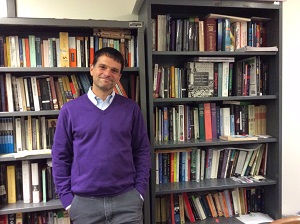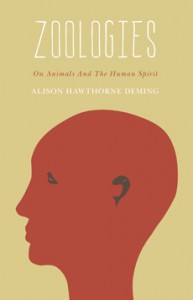
Author and poet Alison Hawthorne
Deming will read from her latest
work, Zoologies: On Animals and
the Human Spirit, on March 19.
She is from literary royalty. Her great-great-grandfather was Nathaniel Hawthorne, the famous author of the The Scarlet Letter, Twice-Told Tales, The House of Seven Gables, and other American classics. Having such a monumental figure in the family might be a little daunting and dissuade one from the writing game, but Alison Hawthorne Deming found a voice of her own and carries the tradition forward.
“Yes, he has influenced me,” she says, speaking by phone from her home in Arizona. “And of course as a young writer I was tremendously intimidated by my illustrious ancestor. The bar was set so high. I had to let go of that fear and simply do what I could do, continuing a legacy in whatever modest way I could manage.”
Who: Alison Hawthorne Deming
What: Poetry reading and discussion
Where: Salisbury Labs 115, Kinnicutt Hall
When: Thursday, March 19, at 7 p.m.
E-mail: huaweb@wpi.edu
Deming is quite the accomplished author in her own right. She is an award-winning poet—the Walt Whitman Award of the Academy of American Poets, two poetry fellowships from the National Endowment for the Arts, and the Pablo Neruda Prize, among others—and the author of four nonfiction books. Her latest is titled Zoologies: On Animals and the Human Spirit, from which she will read on campus next week.
Jim Cocola, assistant professor of humanities and arts, who arranged for Deming’s visit, said he first collaborated with the author in 2013 while completing work as part of a grant with WGBH, digitizing a series of poetry readings that had taken place at MIT in the early 1960s.

Professor Jim Cocola, who arranged the
author’s visit, collaborated with Alison
Hawthorne Deming in 2013 while completing
work as part of a grant with WGBH.
“Given her longstanding interests in the connections between poetry and science, she seemed like the perfect adviser for this collection,” he says. “… This term I’m teaching a course titled, ‘Literature and the Environment,’ and her book seemed like a great way to begin the course–how much the better to do so with a class visit and an evening reading from Alison herself!”
In Zoologies, Deming notes that animals have shared this planet with humans from the beginning of time, but they are leaving us—”both as physical beings and spiritual symbols.” When asked to elaborate, she says, “In India the cow is sacred. In ancient Greece the pig was sacred in the rituals of Eleusinian mysteries. Many indigenous cultures have viewed animals as spiritual presence: eagle, coyote, raven, or rattlesnake.
“In Christianity the Lion of Judah represents Jesus. But as the animals leave, so do many of the beliefs and stories that link human beings to the larger family of creatures, both materially and spiritually. This is a radical loss to the human spirit. Are there new stories that might renew our connection with the animal world? That’s what I have hunted for in this book.”
In addition to reading from Zoologies, Deming says she will also share a few poems from Rope [another book of poetry] and a new manuscript. She also says she is finishing a new book of poems and researching for a new book of essays, and recently finished a sequence of poems about Death Valley.
Cocola sees Deming as an accomplished writer whose energies and gifts are equally apparent in poetry and in prose, and a committed thinker capable as few others of linking the humanities and arts with the natural sciences. “She is one of the very best that we have. Zoologies shows us that there is no thinking the human apart from the animal, and no thinking the animal apart from the human,” he says.
best that we have. Zoologies shows us that there is no thinking the human apart from the animal, and no thinking the animal apart from the human,” he says.
“Remarkably conversant and profoundly informed, Alison Hawthorne Deming is a highly poetic prose writer with a dextrous hand and profound sense of empathy. This book is comprised of passages that are delightful to read and narratives that are difficult to forget.”
When asked if she sees live reading as a natural part of the art of poetry, she says, “Yes, I do a lot of public readings on both poetry and prose. Literature is both a written art form on the page and an oral art. I love both ways of presenting these art forms.”
A former director of the University of Arizona Poetry Center, Deming is currently the Agnese Nelms Haury Professor of Environment and Social Justice in the Creative Writing Program at the University of Arizona, where she is affiliated with the Institute of the Environment. She says wildlife and the great outdoors has always influenced her writing.
“Since childhood I’ve been fascinated by animals and drawn to the dark mystery and peace of forests. I grew up in the deciduous forests of New England and eastern Canada, and these places live in my imagination still even though I live in the Sonoran Desert for much of the year.”
Deming says her concern for the natural world is something she shares with her great-great grandfather. “He was deeply interested in the psychological relationship between people and nature. He saw that early European settlers in New England demonized the wilderness, met it with fear and violence. We are part of a long story of trying to get this relationship right.”
Asked if she sees herself as an animal rights advocate, Deming says, “Certainly I believe animals have rights and that the sphere of human empathy and ethical care should extend beyond the human world. But the focus of my interest is aesthetic and spiritual: What do animals mean to the human imagination? How can art help us answer that question? To answer that question is to understand our responsibility to our fellow creatures.”
Cocola says that any reader of Deming’s Zoologies: On Animals and the Human Spirit is likely to be moved in a range of unexpected ways, from awe to sorrow, and from outrage to action. How much the truer this will be for those that encounter the work in her company: not only for her considerable presentation skills, but also for her commitment to dialogue and reflection,” Cocola says.
“Come to this event for a spirited evening, and prepare to take away a clearer sense of human connection to–and distinction from–the animal kingdom that continues to surrounds us even as we continue to surround it.”



